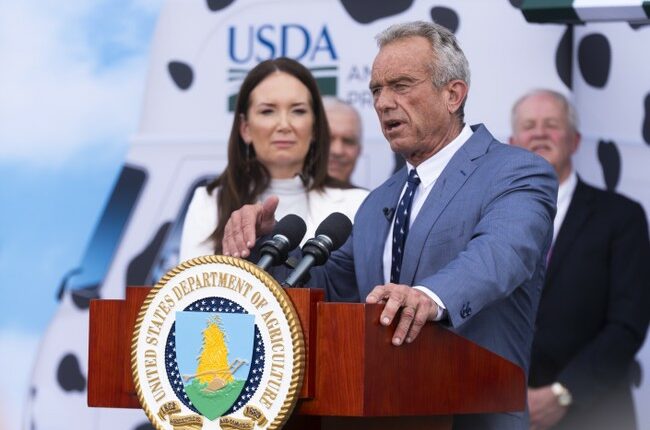Share this @internewscast.com

Recently, Health and Human Services Secretary RFK Jr. and Agriculture Secretary Brooke Rollins introduced updates to the benefits program. During a press briefing, Secretary Rollins emphasized the significance of this policy shift:
“Since my appointment, our department has motivated states to adopt innovative and inventive approaches to tackle the various health challenges Americans face. One method is preventing taxpayer-funded benefits from being used to buy unhealthy products like soda, candy, and junk food. The primary purchase by SNAP recipients is sugary beverages. SNAP is intended as a supplemental nutrition program to help low-income families by subsidizing their food budgets, enabling them to buy the nutritious food needed for good health and wellbeing. This is the core mission of the SNAP program. The law supports this vision, and President Trump’s USDA aims to realize it in collaboration with our HHS allies.”
Rollins further elaborated, disclosing that she has authorized six additional waivers allowing states to exclude unhealthy items from SNAP benefits—supplementing several previously approved state waivers. These waivers are considered a significant achievement by the Trump administration, bringing direct advantages to taxpayers.
RELATED: Arkansas Petitions USDA to Disallow Purchase of Junk Food With SNAP Benefits
Over the years, the SNAP benefits program has posed a challenging issue for the Republican Party. In the same press briefing, RFK Jr. candidly discussed the financial and practical difficulties in removing certain items, highlighting the formidable lobbying by major snack companies that has negatively impacted many low-income Americans throughout the program’s existence. Secretary Kennedy remarked:
“SNAP costs us $405 million daily, with 10% going toward sugary beverages. Including candies, it’s roughly 13 to 17%. While we value free choice in our democracy, taxpayers should not fund sugary sodas. It isn’t fair for taxpayers to pay for foods that contribute to diabetes among the nation’s poorest children. Subsequently, my agency bears the cost through Medicaid and Medicare for these health issues. We’re addressing this systematically, state after state.”
Secretary Kennedy’s brief statement covers a lot. First, he acknowledges the financial complexities in removing these benefits due to successful corporate lobbying efforts that ensure a portion of SNAP funds goes to sugary drink companies. Second, while personal choice is respected, taxpayer money shouldn’t contribute to harming vulnerable people. Battling diabetes is a lifelong burden for many Americans, and there is a collective responsibility to protect children’s health. Lastly, Kennedy highlights the hidden costs to taxpayers—Medicaid and Medicare bear the financial burden due to the unhealthy eating habits fostered by SNAP program options, leading to serious health conditions that the public ultimately funds.
The American people are essentially paying to create unhealthy eating habits through free junk food across the SNAP program, and then paying on the backend for the health issues it causes. Thankfully, the Trump administration and the MAHA movement are beginning to end this cycle through state waivers to remove this garbage. Winning? I’m not tired, are you?

















